|
|
|
Sort Order |
|
|
|
Items / Page
|
|
|
|
|
|
|
| Srl | Item |
| 1 |
ID:
157357


|
|
|
|
|
| Summary/Abstract |
The Second Hague Conference of 1907 is widely regarded as a turning point in the evolution of international society. Constructivist and English School accounts, in particular, highlight the active role played by Latin American delegates in advocating the principles of sovereign equality and nonintervention. I argue that this common interpretation erroneously relies on a retrospective reading of the “norm entrepreneurship” of Latin American states. Rather than aiming to transform the hierarchical international order of the time, foreign policy elites from Latin America sought to use the conference as a platform for increasing their countries’ status. Because of their comparative lack of resources, smaller powers will often try to pursue status through diplomacy and the use of international law, and their status gains in multilateral settings depend on the acquiescence of higher-ranked states. This explains both the diplomatic posturing of Latin American delegates at The Hague and their failure to make substantive status gains.
|
|
|
|
|
|
|
|
|
|
|
|
|
|
|
|
| 2 |
ID:
185241
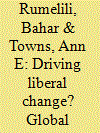

|
|
|
|
|
| Summary/Abstract |
The existing literature on Global Performance Indices (GPIs) is mostly dominated by unit-level analyses focused on specifying the relevant properties of the GPIs and the motivations of state actors in being influenced by GPIs. This article advances a systemic approach, which conceives of GPIs as collectively constituting a system of normative stratification in International Relations (IR). By bringing together the literature on GPIs with the relevant IR literatures on international hierarchies and status-seeking, we identify the structural attributes of the GPI-based system of stratification, how these structural attributes shape the distribution of normative status positions among states, and how this distribution is likely to condition the pursuit of status by states. In particular, we argue that the disaggregated structure and relative ranking of states, respectively, generate status ambiguity and immobility, which both dissuade states from seeking higher moral status through improving their scores in the existing indices. We illustrate the patterns of status ambiguity and immobility present in the GPI-based system of stratification through an empirical analysis of the scores and rank positions of the United States, European Union (EU) members, and “rising powers” in five different indices in the past decade.
|
|
|
|
|
|
|
|
|
|
|
|
|
|
|
|
| 3 |
ID:
148299
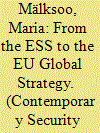

|
|
|
|
|
| Summary/Abstract |
Security strategies are important sites for narrating the EU into existence as a security actor. The unveiling of a new global strategy on foreign and security policy for the EU immediately post-Brexit could be conceived as a pledge to remain together as a Union for the purposes of contributing to global security in a particular way. This paper offers a brief stock-taking of the EU’s way of writing security from the European Security Strategy (2003) to the EU Global Strategy (2016). A concise exegesis of these documents exposes an interesting dynamic: as exercises in ordering the world, both strategic guidelines have turned out to be major exercises in ordering the self. The comparative snapshot shows the EU as increasingly anxious to prove its relevance for its own citizens, yet notably less confident about its actual convincingness as an ontological security framework for the EU’s constituent members over time.
|
|
|
|
|
|
|
|
|
|
|
|
|
|
|
|
| 4 |
ID:
185653
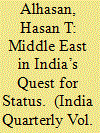

|
|
|
|
|
| Summary/Abstract |
The temptation to explain India’s foreign policy behaviour in the Middle East through the lens of power alone has obscured a rich history of Indian diplomacy in the region that escapes power-centric explanations. India’s relentless advocacy for Palestinian statehood, its diplomatic support for the weaker Arab states against Israel and Western powers and its role in UN mediation and peacekeeping missions in the region are difficult to explain using a structural realist framework that privileges power alone. Challenging the dominant historiographies, this article introduces the concept of status into the study of India’s behaviour in the Middle East. Based on a re-reading of secondary sources, it argues that status and power have been articulated in various ways in India’s behaviour in the Middle East. Under prime ministers Jawaharlal Nehru and Indira Gandhi, India pursued status without power, following a primarily normative strategy of status-seeking in the region that afforded India considerable deference at the United Nations and the Non-Aligned Movement. Following India’s nuclear tests of 1998 and a decade of economic growth, however, power and status converged in India’s behaviour in the Middle East through further alignment with US interests in the region and greater use of naval power projection. By shedding light on the various possible ways in which status and power articulate, this article attempts to step away from the artificial opposition between morals and self-interest as guiding principles of foreign policy. The inquiry into status challenges the prevalent historiographies and analytical frameworks that have dominated the discussion on India’s foreign policy in the Middle East, generating productive openings for reconceptualising and reimagining the field.
|
|
|
|
|
|
|
|
|
|
|
|
|
|
|
|
| 5 |
ID:
187308
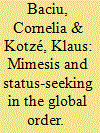

|
|
|
|
|
| Summary/Abstract |
An increasing strand of literature has been studying the dynamics of contestation of the liberal order. Holding that order emergence commences with rhetoric and narratives, this article takes stock of the BRICS summit diplomacy and contestation practices. It pursues a two-level argument. Applying BRICS as a historical case study, the article first reveals how BRICS engages in mimetic performances, re-producing parts of the global order, while simultaneously seeking a re-configuration of the current international system. Second, our analysis shows that through thin and aspiring thick recognition, BRICS countries move toward an enhanced role and status, striving for a better position in the global order. Empirically, to unpack our argument, we analyze BRICS summit diplomacy and rhetoric by unfolding the outcome declarations in the period 2009–2020, as well as BRICS performative practices.
|
|
|
|
|
|
|
|
|
|
|
|
|
|
|
|
| 6 |
ID:
187028
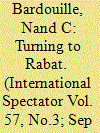

|
|
|
|
|
| Summary/Abstract |
Diplomatic relations between Caribbean and African countries are a driving force behind their respective contributions to the conduct of international politics, as the past decade-plus of little-known Organisation of Eastern Caribbean States (OECS)-Moroccan relations attests. An analysis of the latter sheds new light on two, interlinked sets of dynamics. First, there is an interplay between those enhanced relations and OECS members’ status-seeking behaviour – through recognition as pro-Rabat, Western Sahara agenda influencers – in a hierarchical system of sovereign states. Second, having regard to the subsequent benefits, the OECS bloc is taking a hard-nosed approach to aligning itself with and diplomatically backing Rabat, which could conflict with some long-established foreign policy tenets of these states.
|
|
|
|
|
|
|
|
|
|
|
|
|
|
|
|
|
|
|
|
|